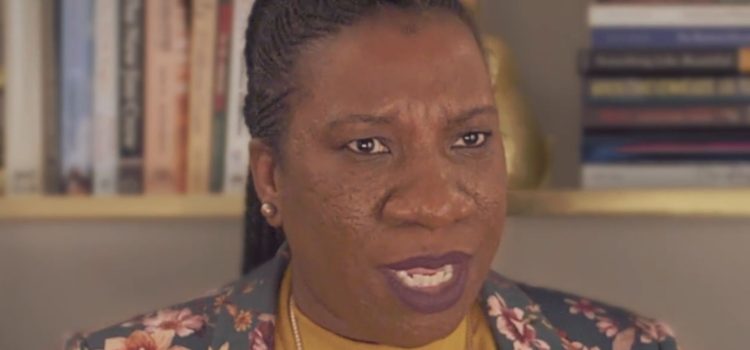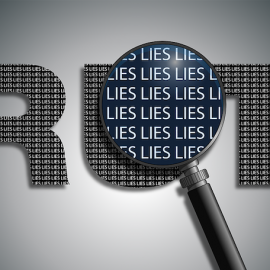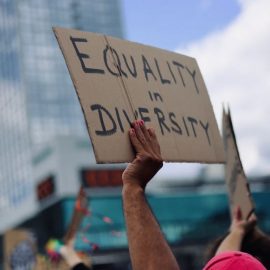
Why did Tarana Burke start “me too?” What was the breaking point that led Burke to say those words?
Burke says that the betrayals she and her child experienced at Sanders’s hands eroded her trust in and commitment to her community. She’d also hit dead ends when trying to find resources to help her and others who had suffered from childhood sexual abuse and wanted to change that.
Let’s check out the moments that led to Burke saying “me too.”
What Prompted Burke to Say “me too?”
Why did Tarana Burke start “me too?” Betrayals helped her recognize the need for anti-sexual violence activism within her community. A second factor also made this need evident: When Burke tried to find resources and support for victims of childhood sexual abuse, she hit dead ends. Burke explains that in her work with children, many girls disclosed that they’d experienced sexual violence. She took several of them temporarily into her home to help keep them safe. But Burke felt helpless to prevent harm from befalling them, and every resource she tried to enlist in helping them, including the local rape crisis center, was unwilling to help.
(Shortform note: Since children and adolescents are dependent on the adults in their lives to ensure their well-being, those who suffer violence often rely on informal adult advocates, like Burke, to help them access and navigate safety and healing resources. But that’s just one piece of the puzzle (and for many children, even that piece never falls into place). Young victims of violence often also face systemic barriers to seeking professional help—for example, rape crisis centers and similar resources are chronically underfunded and overextended in many areas. Children also often have difficulty accessing resources due to cost and lack of transportation, and many professionals are underqualified to offer the kind of support child victims of sexual violence need.)
In a moment of intense dejection after she ran into these dead ends in 2005, Burke prayed for direction. God’s response, she says, was that she must forge a new path ahead: Since she couldn’t protect vulnerable girls from sexual abuse, she would help them heal, using what she’d learned from her own healing journey. (Shortform note: In Seeking Wisdom, Julia Cameron says that prayer can bolster your creativity. Although Cameron’s advice is intended to help artists capture inspiration, Burke demonstrates that this method can be applied to creative problem-solving, too.)
Burke says she realized that to effectively lead such a program, she’d have to be honest and vulnerable about her own experiences of victimization and healing. This required her to finally face the memories she’d stuffed down for years. She dedicated a night to remembering all she’d gone through. At first, this process was agonizing, but eventually, pain gave way to contemplative thought. Her memories provided valuable insights—she realized that empathizing with Maya Angelou had helped her feel less ashamed and that the prospect of empathic connection had emboldened Heaven to break her silence.
With the importance of empathic connection in mind, she came up with the phrase “me too,” which would become a cornerstone of her movement.
(Shortform note: Why did Burke have to face her traumatic memories in order to help other victims of sexual violence? Many trauma survivors struggle with intrusive memories, which are vivid, unwanted trauma recollections like the flood of memories Burke experienced when Heaven told her she’d been abused. Those who suffer from intrusive memories often respond by consciously suppressing them, which makes them less potent when they recur. However, experts believe that you can only begin healing from trauma by confronting your memories head-on (ideally with the help of a therapist). This is because healing requires that you make sense of your trauma as a meaningful part of your life story—like Burke did by turning her pain into an opportunity to serve others.)
| The Power of Empathy in Healing Sexual Violence The basis of Burke’s “me too” movement is empathy—the ability to put yourself in someone else’s shoes, which is often easier when you share common experiences. Let’s explore the role empathy plays in healing from sexual violence. Burke explains that Angelou’s influence on her taught her that when survivors empathize with other victims of sexual violence, it can help them see themselves in a more compassionate light. Burke also suggests, based on her experience with Heaven, that a survivor may be more likely to open up about their experiences if they think the person is likely to empathize with them (because they’re also a survivor). Some researchers argue that both of these effects of empathy—improved self-compassion and transparency leading to solidarity—are the foundation for structural change: The more victims call attention to the problem of sexual violence and unite to overcome it, the more society deems prevention and accountability necessary. Experts note that an empathic approach to the problem of sexual violence can foster societal healing in other ways. For example, trauma expert Judith Herman argues that victims of violence long for a sense of justice. For many victims, this sense of justice is nontraditional. Instead of hoping that those who harmed them will be punished (for example, with legal consequences), they want their communities to hear, validate, and respect their experiences, instead of shaming them or enforcing their silence. Some survivors also hope for restorative or transformative justice, which gives offenders opportunities to understand and rectify the harm they’ve done and to work toward a future without violence. All these visions of violence incorporate empathy—in some cases, not only for the victim, but also for the perpetrator. |






